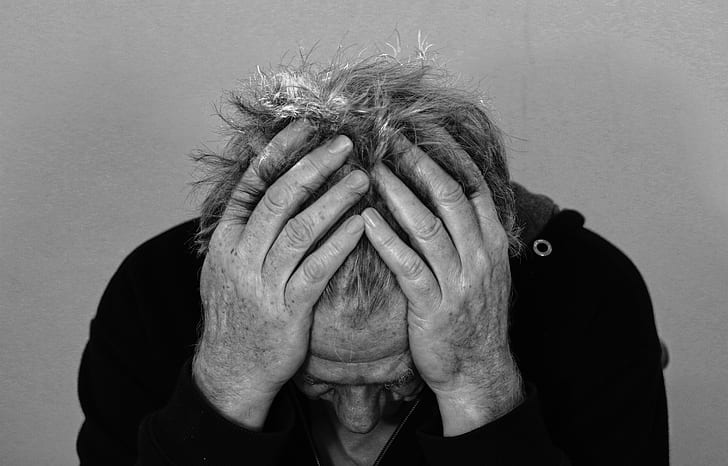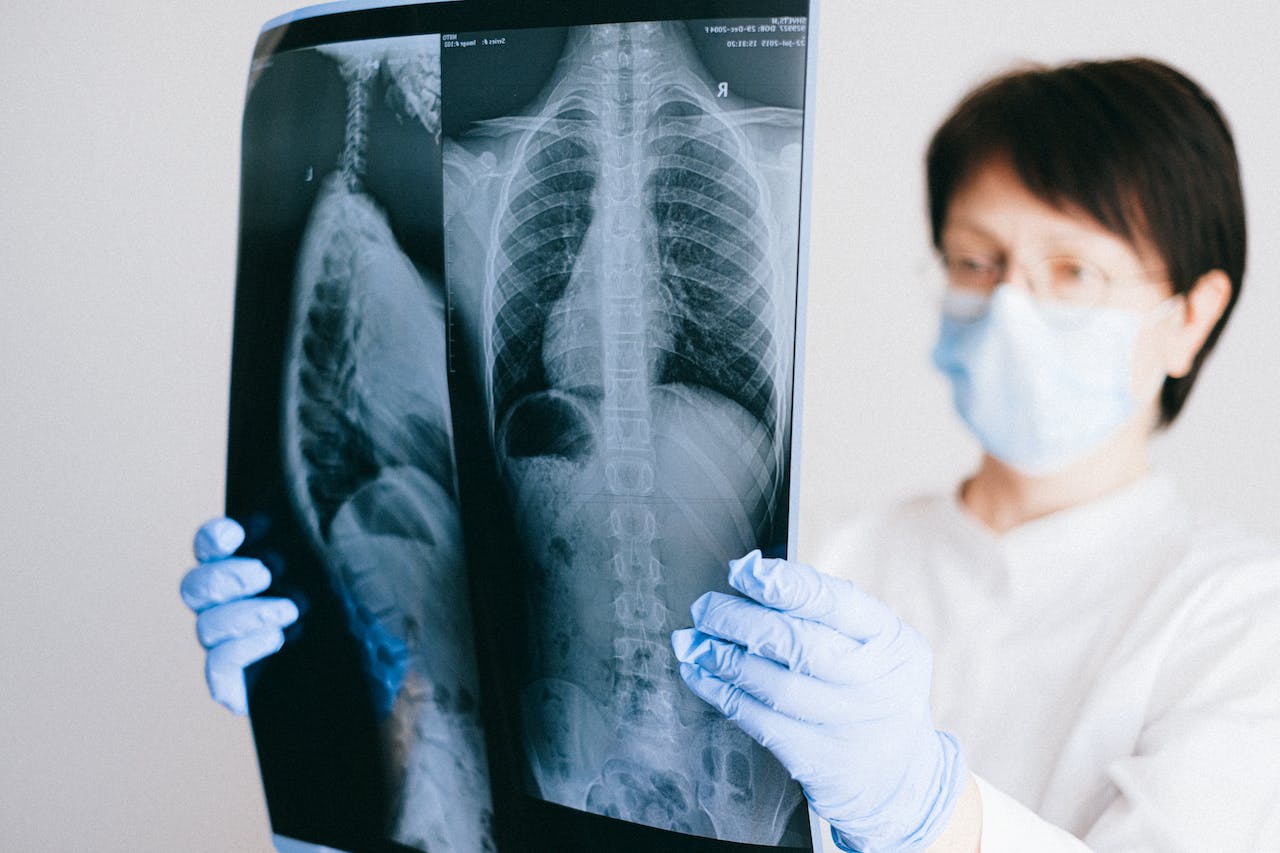Experiencing anxiety with chest pain can be distressing and unsettling. While anxiety chest pain can mimic the symptoms of a heart attack, it is typically harmless and not life-threatening. Nevertheless, it is crucial to address and manage anxiety to alleviate chest pain and promote overall well-being.
In this article, we will explore what causes anxiety with chest pain, what it feels like, and effective strategies that can help individuals stop anxiety chest pain, enabling them to improve their quality of life.

Anxiety With Chest Pain: What Does it Feel Like?
Anxiety with chest pain can manifest in various sensations and symptoms, which can vary from person to person. Those experiencing anxiety with chest pain may describe it as a tightness or pressure in the chest, akin to someone sitting on their chest or a heavy weight pressing down. Others may feel an aching or burning sensation in their chest, or even numbness.
If you have concerns about your symptoms or are unsure about the cause of your chest pain, it is important to consult with a healthcare professional to rule out any underlying medical conditions. They can provide a proper diagnosis and guide you towards appropriate treatment options, which may include therapy, medication, or other interventions to help manage anxiety and reduce chest pain. We’ll explore these treatment and management options later in this article! Remember, seeking medical attention is essential to ensure your well-being and peace of mind.
Difference Between Anxiety Chest Pain and Heart Attack Chest Pain
Anxiety chest pain and heart attack chest pain may share similar symptoms, but there are clear differences that can help individuals distinguish between the two. Understanding these differences is crucial in order to seek appropriate medical attention and avoid unnecessary alarm.
One key distinction is the location and nature of the pain. Anxiety chest pain is typically limited to the chest area, while heart attack chest pain often radiates to other parts of the body, such as the arms, shoulders, neck, or jaw. Additionally, anxiety with chest pain is often described as a dull ache or pressure, while heart attack chest pain is commonly described as a crushing or squeezing sensation.
Onset and duration are also important factors in differentiating between the two conditions. Anxiety chest pain can occur at any time, including during periods of rest, whereas heart attack chest pain often occurs during physical activity or exertion. Furthermore, anxiety chest pain typically resolves within a short period, often minutes to hours, while heart attack chest pain is more persistent and can last longer, sometimes even for hours.
If you are experiencing chest pain, it is essential to consult with a healthcare professional who can provide an accurate diagnosis. While anxiety with chest pain is usually benign and related to stress or anxiety, it is important not to dismiss potential heart-related concerns.

How Does Anxiety Cause Chest Pain?
Anxiety can cause chest pain through the physiological responses that occur in the body during moments of stress. When a person experiences anxiety, the body goes into a fight or flight response, triggering the release of cortisol and adrenaline. These hormones increase heart rate, blood pressure, and muscle tension.
Rapid heart rate and blood pressure can lead to chest pain. The heart works harder to pump blood, causing the arteries to constrict and reducing blood flow to the heart muscle. This can result in a feeling of heaviness or pressure in the chest.
Hyperventilation, a common symptom of anxiety, can also contribute to chest pain. During moments of anxiety, breathing becomes rapid and shallow, leading to a decrease in carbon dioxide levels in the blood. This can cause chest tightness and discomfort.
Muscle tension is another factor in anxiety-induced chest pain. When we are anxious, our muscles tense up, including those in the chest and ribcage. This can lead to aching or discomfort in the chest area.
How Can I Stop Anxiety Chest Pain?
From relaxation techniques to seeking professional help, understanding how to manage anxiety-related chest pain is essential in regaining control and finding relief. If you are experiencing anxiety with chest pain, here are some strategies to consider that may help you.
1. Try a Breathing Exercise
When anxiety strikes and you experience chest pain, one effective way to calm both your mind and body is to practice deep breathing techniques. Deep breathing can help control your breath and reduce your heart rate during an anxiety attack.
One simple breathing exercise to try is the 4-7-8 breath. Begin by sitting or lying down in a comfortable position. Take a deep breath in through your nose for a count of 4. Hold your breath for a count of 7, and then exhale slowly through your mouth for a count of 8. Repeat this cycle several times until you feel a sense of relaxation.
Another technique to consider is the box breath. Start by inhaling deeply through your nose for a count of 4, allowing your belly to rise. Hold your breath for a count of 4. Exhale slowly through your mouth for a count of 4, allowing your belly to fall. Hold your breath again for a count of 4. Repeat this pattern for a few minutes or until you begin to feel a sense of ease.
Belly breathing, also known as diaphragmatic breathing, is yet another effective breathing exercise. To practice this technique, place one hand on your chest and the other hand on your belly. Take slow, deep breaths in through your nose, allowing your belly to rise and expand. Exhale slowly through your mouth, feeling your belly deflate. Repeat this pattern for several minutes, focusing on the sensation of your breath flowing in and out.
Remember, when experiencing anxiety with chest pain, these breathing exercises can help calm rapid breathing and promote relaxation. Incorporating these techniques into your daily routine can lead to a greater sense of calm, alleviate the discomfort associated with anxiety, and even contribute to improved mental health.
2. Use Relaxation Techniques
When experiencing anxiety with chest pain, it can be helpful to utilise relaxation techniques to calm the mind and body. Meditation is a powerful technique that can provide relief from anxious thoughts and promote relaxation. Taking a few moments to focus on your breath and bring your attention to the present moment can significantly reduce anxiety chest pain.
Another effective technique is visualising a safe place. This involves closing your eyes and imagining yourself in a peaceful and secure environment. This mental imagery helps to shift your focus away from anxious thoughts and promotes a sense of relaxation.
For those who prefer guidance, there are smartphone apps available that offer stress-reduction exercises and meditation options. These apps provide step-by-step instructions to help individuals practice relaxation techniques in their own time and space.
Practising relaxation techniques regularly can not only alleviate anxiety with chest pain in the moment but also improve overall emotional well-being. By incorporating these techniques into your daily routine, you can manage anxiety more effectively and enhance your quality of life.

3. Keep Active
Staying physically active is a crucial aspect of managing anxiety and reducing symptoms of anxiety with chest pain. Regular exercise not only improves our physical health but also has a significant impact on our mental well-being.
Engaging in physical activities helps to reduce muscle tension, which is commonly associated with anxiety. As we exercise, our body releases chemicals like serotonin, which promotes a sense of relaxation and happiness. This can help alleviate the physical discomfort associated with anxiety chest pain and contribute to overall symptom reduction.
To benefit from exercise in managing anxiety, it is recommended to participate in activities such as cardio exercises, yoga, or even simple activities like walking for at least 30 minutes a day. These activities help increase blood flow and oxygen circulation, promote deep breathing, and activate the body’s relaxation response.
When incorporating exercise into your routine, it’s important to choose activities that you enjoy and feel comfortable with. This will not only enhance adherence to the exercise regimen but also add an element of enjoyment and stress relief to your daily routine.
Remember, managing anxiety and reducing symptoms is a holistic process, and regular exercise is a valuable component of that approach. Always consult with a healthcare professional to determine the most appropriate exercise plan for your individual needs.
4. Prioritise Sleep
One effective strategy to reduce anxiety and alleviate chest pain is to prioritise sleep. A regular bedtime routine and aiming for 7-9 hours of sleep per night can significantly improve your overall well-being and promote relaxation.
Establishing a consistent bedtime routine helps signal to your body that it is time to wind down and prepare for sleep. This can involve activities such as reading a book, taking a warm bath, or practising relaxation techniques. By following a routine, you create a sense of structure and predictability, which can help calm the mind and reduce anxiety.
5. Seek Out Therapy
One of the key components in addressing anxiety with chest pain is therapy, particularly cognitive behavioural therapy (CBT). This form of therapy can be highly effective in helping individuals identify triggers and develop coping methods to manage anxiety symptoms, like chest pain.
CBT aims to change negative thought patterns and behaviours by teaching individuals practical strategies for managing anxiety. By working with a therapist, individuals can learn to recognise and challenge negative thoughts that contribute to their anxiety and replace them with more positive and realistic thinking patterns.
Therapy can be particularly beneficial for individuals with various anxiety disorders, such as panic disorder, generalised anxiety disorder, and social anxiety disorder. If accessing therapy in your local area is an issue, online therapy is also an option.
In addition to CBT, other therapeutic approaches, such as relaxation training and exposure therapy, may also be utilised to address anxiety. These techniques can help individuals develop skills to manage their anxiety and improve their overall quality of life.

6. Limit Alcohol, Caffeine, and Smoking
Limiting alcohol, caffeine, and smoking can be effective in managing anxiety with chest pain. While these substances may offer temporary relief from anxiety symptoms, they can actually worsen anxiety in the long run. It is important for individuals to take note of their consumption patterns and identify which substance negatively affects them the most.
1. Alcohol: While alcohol may provide temporary relaxation, it can disrupt sleep patterns and lead to increased feelings of anxiety and depression. Limiting alcohol intake, especially before bedtime, can significantly improve symptoms.
2. Caffeine: Caffeine is a stimulant that can trigger anxiety symptoms such as heart palpitations and restlessness. It is advised to limit or avoid caffeine-containing beverages like coffee, tea, and energy drinks. Switching to decaffeinated options or herbal teas can be beneficial.
3. Smoking: Nicotine in cigarettes is a known stimulant that can contribute to anxiety symptoms. Quitting smoking or reducing the number of cigarettes smoked can have significant positive effects on anxiety levels.
Individuals should aim to reduce their intake gradually and monitor how it affects their anxiety.
When Do I Need to Seek Help For Anxiety With Chest Pain?
When experiencing chest pain, it is important to know when to seek medical help. While anxiety-related chest tightness and pain is a common symptom, it is essential to differentiate between anxiety and potentially serious heart conditions. If you are unsure, it is always better to err on the side of caution and seek medical attention, especially if the chest pain is persistent or interferes with daily life.
Persistent chest pain that lasts for several minutes or more can be a cause for concern and should prompt you to seek help. Additionally, if the chest pain changes in intensity, location, or character, or if it radiates to your arm, jaw, neck, or back, it is crucial to seek immediate medical attention.
A healthcare professional can evaluate your symptoms, perform necessary tests, and provide a proper diagnosis. It is always advised to consult with a healthcare professional rather than self-diagnosing or ignoring the symptoms.


